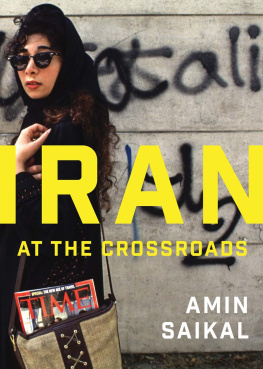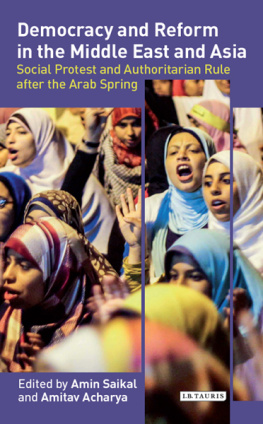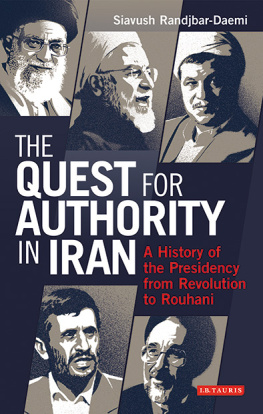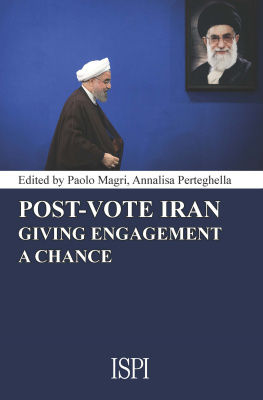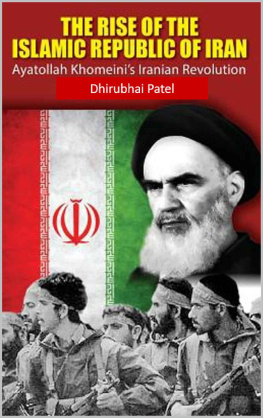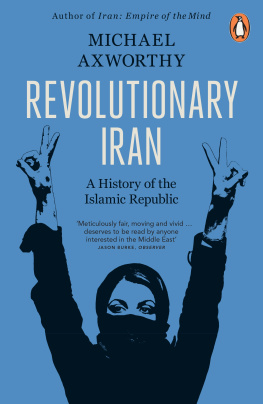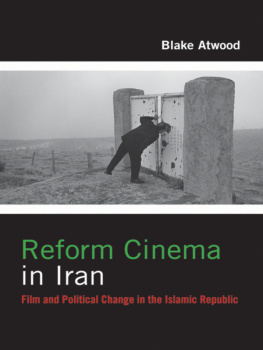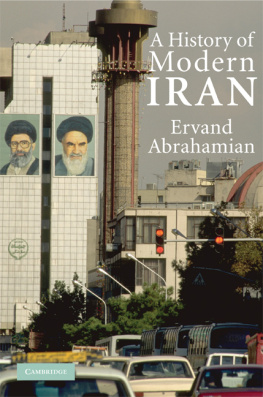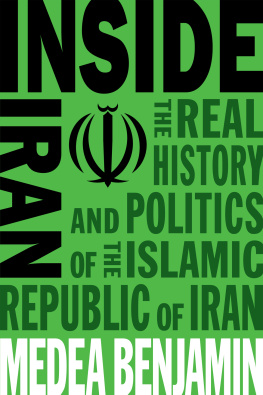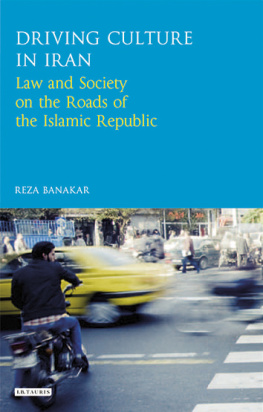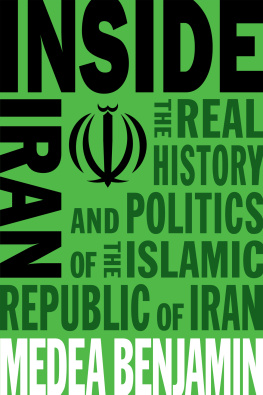Amin Saikal - Iran at the Crossroads
Here you can read online Amin Saikal - Iran at the Crossroads full text of the book (entire story) in english for free. Download pdf and epub, get meaning, cover and reviews about this ebook. year: 2016, publisher: Polity Press, genre: Politics. Description of the work, (preface) as well as reviews are available. Best literature library LitArk.com created for fans of good reading and offers a wide selection of genres:
Romance novel
Science fiction
Adventure
Detective
Science
History
Home and family
Prose
Art
Politics
Computer
Non-fiction
Religion
Business
Children
Humor
Choose a favorite category and find really read worthwhile books. Enjoy immersion in the world of imagination, feel the emotions of the characters or learn something new for yourself, make an fascinating discovery.
- Book:Iran at the Crossroads
- Author:
- Publisher:Polity Press
- Genre:
- Year:2016
- Rating:4 / 5
- Favourites:Add to favourites
- Your mark:
- 80
- 1
- 2
- 3
- 4
- 5
Iran at the Crossroads: summary, description and annotation
We offer to read an annotation, description, summary or preface (depends on what the author of the book "Iran at the Crossroads" wrote himself). If you haven't found the necessary information about the book — write in the comments, we will try to find it.
Iran at the Crossroads — read online for free the complete book (whole text) full work
Below is the text of the book, divided by pages. System saving the place of the last page read, allows you to conveniently read the book "Iran at the Crossroads" online for free, without having to search again every time where you left off. Put a bookmark, and you can go to the page where you finished reading at any time.
Font size:
Interval:
Bookmark:
- Sources of opposition
For Mary-Lou, Rahima, Samra and Amina
Amin Saikal
polity
Copyright Amin Saikal 2016
The right of Amin Saikal to be identified as Author of this Work has been asserted in accordance with the UK Copyright, Designs and Patents Act 1988.
First published in 2016 by Polity Press
Polity Press
65 Bridge Street
Cambridge CB2 1UR, UK
Polity Press
350 Main Street
Malden, MA 02148, USA
All rights reserved. Except for the quotation of short passages for the purpose of criticism and review, no part of this publication may be reproduced, stored in a retrieval system, or transmitted, in any form or by any means, electronic, mechanical, photocopying, recording or otherwise, without the prior permission of the publisher.
ISBN-13: 978-0-7456-8568-7
A catalogue record for this book is available from the British Library.
Library of Congress Cataloging-in-Publication Data
Saikal, Amin, 1950
Iran at the crossroads / Amin Saikal.
pages cm
Includes bibliographical references and index.
ISBN 978-0-7456-8564-9 (hardback) -- ISBN 978-0-7456-8565-6 (pbk.) 1.Iran--History--1979-1997. 2. Iran--History--1997 3. Islam and state--Iran. 4. Iran--Foreign relations--United States. 5. United States--Foreign relations--Iran. I. Title.
DS318.8.S24 2015
955.054--dc23
2015011699
The publisher has used its best endeavours to ensure that the URLs for external websites referred to in this book are correct and active at the time of going to press. However, the publisher has no responsibility for the websites and can make no guarantee that a site will remain live or that the content is or will remain appropriate.
Every effort has been made to trace all copyright holders, but if any have been inadvertently overlooked the publisher will be pleased to include any necessary credits in any subsequent reprint or edition.
For further information on Polity, visit our website:
politybooks.com
The Islamic Republic of Iran has forged a unique system of governance and pursued an unorthodox foreign policy posture in support of this system. The two, in combination with one another, have landed the Republic with many domestic difficulties and foreign policy complications since its advent in 1979. Yet, the Republic has managed to survive all internal and external challenges in an oil-rich but highly turbulent region, where local sectarian and geopolitical rivalries and foreign power interventions have played a key destabilizing role. In fact, although surrounded by active conflicts, especially in Afghanistan, Iraq, Syria and Bahrain, the Iranian theocratic pluralist political order has proved to be more resilient than could originally be anticipated. Whatever ones view of the order, it is now grounded in solid structures, with sufficient resources at its disposal to deal with any domestic disorder or to defy foreign pressures, from the United States and some of its allies in particular.
However, this has come at certain costs for the Iranian people, a majority of whom would have expected to enjoy better living conditions in view of Irans rich human and non-human, especially oil, resources. Many Iranians have grown to be critical of both their government and the West, more specifically the United States, which has subjected Iran to severe sanctions, particularly over the countrys nuclear programme. Meanwhile, a fresh air of optimism has come to grip most Iranians in the era of pragmatist Presidents Hassan Rouhani and Barack Obama, both of whom have shown a marked desire for a possible USIranian rapprochement.
The Islamic Republic is now indeed positioned at a crossroads. Should its Islamic government under Rouhani succeed in ending the US-led sanctions, based on a comprehensive settlement of Irans nuclear issue, and engage in major domestic and foreign policy reforms, Iran stands to be a very important and constructive regional power a power that could also help the US to be a more effective player in the Middle East. However, if Rouhani fails in his mission, either due to domestic and regional opposition, or because of a similar factor torpedoing Obamas efforts, Iran can be expected to remain impregnated with serious seeds of instability and its region to experience more volatility.
This short book is grounded in my accumulative study of Iranian politics and society, as well as its regional landscape, over a long period of time. I owe much to so many people and institutions in the region and beyond. I cannot mention all of them, as some would not want to be publicly identified. However, it would be remiss of me not to register my sincere thanks to all of them, whether in Iran or elsewhere. Beyond this, I am deeply indebted to my very able research assistant, Stephanie Wright, whose help from the University of California, Santa Barbara, where she is a graduate student, has been instrumental in enabling me to complete this book. I am also thankful to another very bright graduate of the Australian National University (ANU), William Jenkins, who has developed an admirable knowledge of Persian language and Iranian society, for reading the final draft of the manuscript. Similarly, I am grateful to Dr Zahra Taheri for her advice, especially in relation to Iranian history, and to Louise Knight for encouraging me to write this book and to her Polity team, particularly Pascal Porcheron, for handling the logistics of the project.
Further, I must thank past and present professional staff of the Centre for Arab and Islamic Studies (the Middle East and Central Asia), of which I am the director, at the ANU. In this regard, I must mention Kerry Pert, Carol Laslett, Leila Kouatly, Lissette Geronimo, Pamela Lourandos and Anita Mack.
Finally, I owe a world of gratitude to my life partner and friend, Mary-Louise Hickey, whose love and support have made her a rock in whatever I do. As for my three lovely daughters, Rahima, Samra and Amina, they always remain the best I could ever wish for in life.
Note: In this book, the terms jihadi and ijtihadi are used strictly as they are described in the context of Iranian politics, with the first denoting revolutionary/traditionalist/conservative, and the latter meaning reformist/internationalist.
Amil Saikal
Canberra, June 2015
Introduction
In December 1977, US President Jimmy Carter delivered a speech in Tehran in which he praised the countrys close relations with his own. He described the oil-rich, pro-Western monarchical Iran as an island of stability in one of the more troubled areas of the world. He attributed this stability to the great leadership of the Shah, stating, this is a great tribute to you, Your Majesty, and to your leadership and to the respect and the admiration and love which your people give to you. As it turned out, President Carter spoke too soon about the Western-backed autocrat Mohammad Reza Shah Pahlavi. Little more than a year later, the Shah was overthrown in the mass revolution of 1978/79 that gave rise to Ayatollah Ruhollah Khomeinis Islamic government, and a new Iran with an anti-American and anti-Israeli posture.
Font size:
Interval:
Bookmark:
Similar books «Iran at the Crossroads»
Look at similar books to Iran at the Crossroads. We have selected literature similar in name and meaning in the hope of providing readers with more options to find new, interesting, not yet read works.
Discussion, reviews of the book Iran at the Crossroads and just readers' own opinions. Leave your comments, write what you think about the work, its meaning or the main characters. Specify what exactly you liked and what you didn't like, and why you think so.

